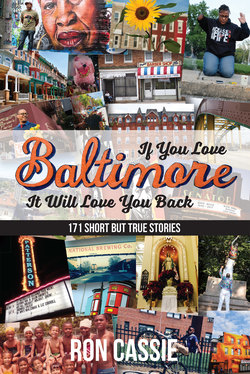Читать книгу If You Love Baltimore, It Will Love You Back - Ron Cassie - Страница 29
На сайте Литреса книга снята с продажи.
ОглавлениеHarbor East
President Street
Nov. 15, 2012
17. President Street
Another body cannot possibly squeeze into the packed house at James Joyce’s Irish Pub & Restaurant, an early anchor in Harbor East when it served its first Guinness pint and plate of corned beef and cabbage a decade ago. Leading the pub’s 10th anniversary party on stage this November night, in his familiar-to-Baltimoreans, tight black T-shirt, Gov. Martin O’Malley strums his guitar and leans into the microphone, taking his band, O’Malley’s March, through an energetic set of Celtic ballads and Irish-tinged rock songs, including a cover of The Pogues’ “Dirty Little Town.”
“Dreamed a dream by the old canal
I kissed my girl by the factory wall
Dirty old town
Dirty old town”
The song, cast in a struggling industrial city, couldn’t be more appropriate for O’Malley, who performed here at the pub’s opening as then-Mayor of Baltimore—when Harbor East was still mostly empty warehouses and desolate docks. At the time, the city’s crime and homicide rates were becoming the stuff of legend in the HBO series The Wire—an image O’Malley fought like crazy and a show that gets his ire up to this day. Now, however, the holiday lights decorating the hotel, restaurant, and gleaming office buildings behind him in the pub’s front glass window seem almost symbolic, an affirmation of the burgeoning upscale district, the city’s potential for wider rebirth, and even O’Malley’s political career, which is experiencing something of a revival tonight.
He’d suffered through a disappointing General Assembly earlier last year when legislators ignored or punted much of his agenda, barely managing to pass a “doomsday” budget just before midnight on the session’s final day. But a week earlier, on election night, O’Malley rebounded remarkably. The Governor had thrown his full weight behind several risky hot-button referendum issues—Maryland’s same-sex marriage law; the Dream Act (to assist undocumented immigrants with in-state tuition); an expansion of gambling; and a new, partisan congressional map—and won on all four measures.
On top of those victories, as then-head of the Democratic Governor’s Association, O’Malley had advocated tirelessly for President Barack Obama in his reelection bid, frequently appearing on the Sunday talk shows to square off with the Republican opposition. In the aftermath of Obama’s victory, O’Malley’s effective stumping added to the perception of his growing political momentum. Almost immediately after the votes were counted, political pundits, on the basis of O’Malley’s referendum victories and increased national stature, put him on the short list of 2016 Democratic contenders with former Secretary of State Hillary Clinton, Vice President Joe Biden, and New York Governor Andrew Cuomo.
“I saw him play at McGinn’s on Charles Street, which became Mick O’Shea’s, when he was playing there regularly,” says Ellen Muth. “He’s debonair, handsome the way JFK was in the 1960s.”
Her daughter, Lane, standing next to her between sets, also saw O’Malley play many times when he was mayor. “I told my mom then, ‘He’s going to be president in 10 years.’” Not necessarily because of any legislative achievements, Lane admits, but instead because of one of O’Malley’s most commented-upon attributes as a politician, “because he was charming and appealing.”
Standing at the corner of Harford Road and the Alameda announcing that he was running for mayor in June of ١٩٩٩, O’Malley’s political future was hardly guaranteed—as is often posited given his sturdy good looks and marriage to former Maryland Attorney General Joe Curran›s daughter—let alone destined for a White House bid. He entered the race late, not jumping in until after former NAACP head Kweisi Mfume announced he was staying out.
Perhaps it’s worth noting, for those who believe in such signs, that the James Joyce’s Pub is located, of course, on President Street.
Update: O’Malley suspended his 2016 presidential campaign following a poor showing in the first presidential primary in Iowa.
